This contains all alchemy-related functions. More...

Go to the source code of this file.
Functions | |
| static void | adjust_product (object *item, int lvl, int yield) |
| We adjust the nrof of the final product, based on the item's default parameters, and the relevant caster skill level. | |
| static void | alchemy_failure_effect (object *op, object *cauldron, recipe *rp, int danger) |
| Ouch. | |
| static void | attempt_do_alchemy (object *caster, object *cauldron) |
| Main part of the ALCHEMY code. | |
| static object * | attempt_recipe (object *caster, object *cauldron, int ability, recipe *rp, int nbatches, int ignore_cauldron) |
| Essentially a wrapper for make_item_from_recipe() and insert_ob_in_ob(). | |
| static int | calc_alch_danger (object *caster, object *cauldron, recipe *rp) |
| "Danger" level, will determine how bad the backfire could be if the user fails to concoct a recipe properly. | |
| static const char * | cauldron_sound (void) |
| Returns a random selection from cauldron_effect[]. | |
| static int | content_recipe_value (object *op) |
| Recipe value of the entire contents of a container. | |
| static recipe * | find_recipe (recipelist *fl, int formula, object *ingredients) |
| Find a recipe from a recipe list that matches the given formula. | |
| static object * | find_transmution_ob (object *first_ingred, recipe *rp, size_t *rp_arch_index, int create_item) |
| Looks through the ingredient list. | |
| static int | is_defined_recipe (const recipe *rp, const object *cauldron, object *caster) |
| Determines if ingredients in a container match the proper ingredients for a recipe. | |
| static object * | make_item_from_recipe (object *cauldron, recipe *rp) |
| Using a list of items and a recipe to make an artifact. | |
| static int | numb_ob_inside (object *op) |
| Returns the total number of items in op, excluding ones in item's items. | |
| static void | remove_contents (object *first_ob, object *save_item) |
| All but object "save_item" are elimentated from the container list. | |
| int | use_alchemy (object *op) |
| Handle use_skill for alchemy-like items. | |
Variables | |
| static const char *const | cauldron_effect [] |
| define this for some helpful debuging information | |
Detailed Description
This contains all alchemy-related functions.
Definition in file alchemy.c.
Function Documentation
| static void adjust_product | ( | object * | item, |
| int | lvl, | ||
| int | yield | ||
| ) | [static] |
We adjust the nrof of the final product, based on the item's default parameters, and the relevant caster skill level.
- Parameters:
-
item item to adjust. lvl alchemy skill level. yield how many products the recipe returns at maximum.
Definition at line 373 of file alchemy.c.
References rndm().
Referenced by attempt_recipe().


| static void alchemy_failure_effect | ( | object * | op, |
| object * | cauldron, | ||
| recipe * | rp, | ||
| int | danger | ||
| ) | [static] |
Ouch.
We didnt get the formula we wanted. This fctn simulates the backfire effects--worse effects as the level increases. If SPELL_FAILURE_EFFECTS is defined some really evil things can happen to the would be alchemist. This table probably needs some adjustment for playbalance. -b.t.
- Parameters:
-
op who tried to do alchemy. cauldron container that was used. rp recipe that failed. danger danger value, the higher the more evil the effect.
Definition at line 502 of file alchemy.c.
References add_string(), recipestruct::arch_name, recipestruct::arch_names, attempt_recipe(), cast_magic_storm(), cauldron_sound(), change_attr_value(), CLEAR_FLAG, create_archetype(), draw_ext_info(), draw_ext_info_format(), fire_arch_from_position(), FLAG_CAN_ROLL, FLAG_CURSED, FLAG_IDENTIFIED, FLAG_KNOWN_CURSED, FLAG_NO_PICK, FOOD, free_object(), free_string(), generate_artifact(), get_formulalist(), get_random_mon(), get_random_recipe(), insert_ob_in_map(), insert_ob_in_ob(), llevDebug, LOG(), LOOSE_MANA, M_STONE, MSG_TYPE_SKILL, MSG_TYPE_SKILL_FAILURE, MSG_TYPE_SKILL_SUCCESS, NDI_UNIQUE, npc_call_help(), numb_ob_inside(), PREFER_HIGH, PREFER_LOW, QUERY_FLAG, random_roll(), remove_contents(), rndm(), SET_FLAG, SP_MED_FIREBALL, and summon_hostile_monsters().
Referenced by attempt_do_alchemy().
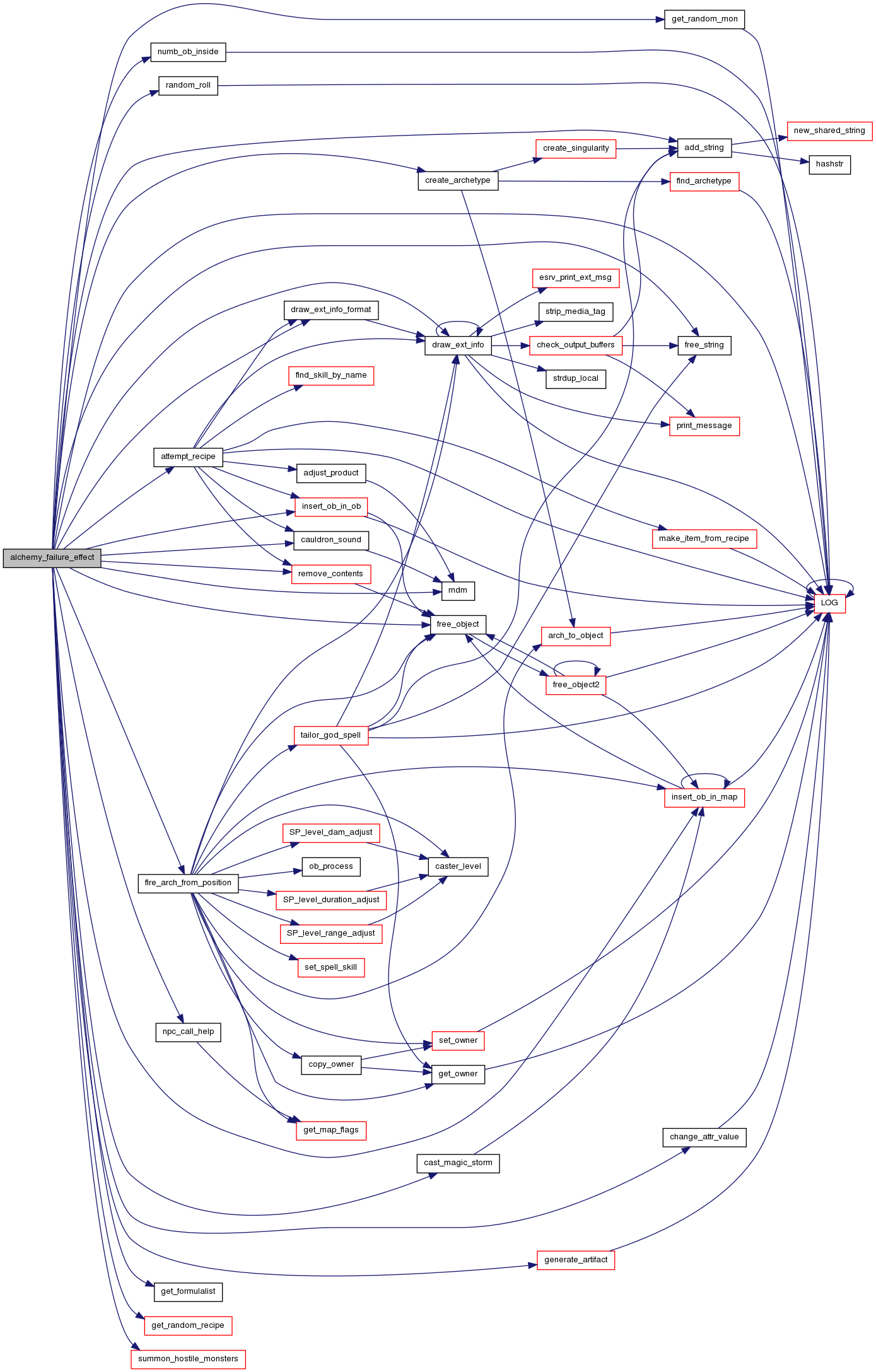
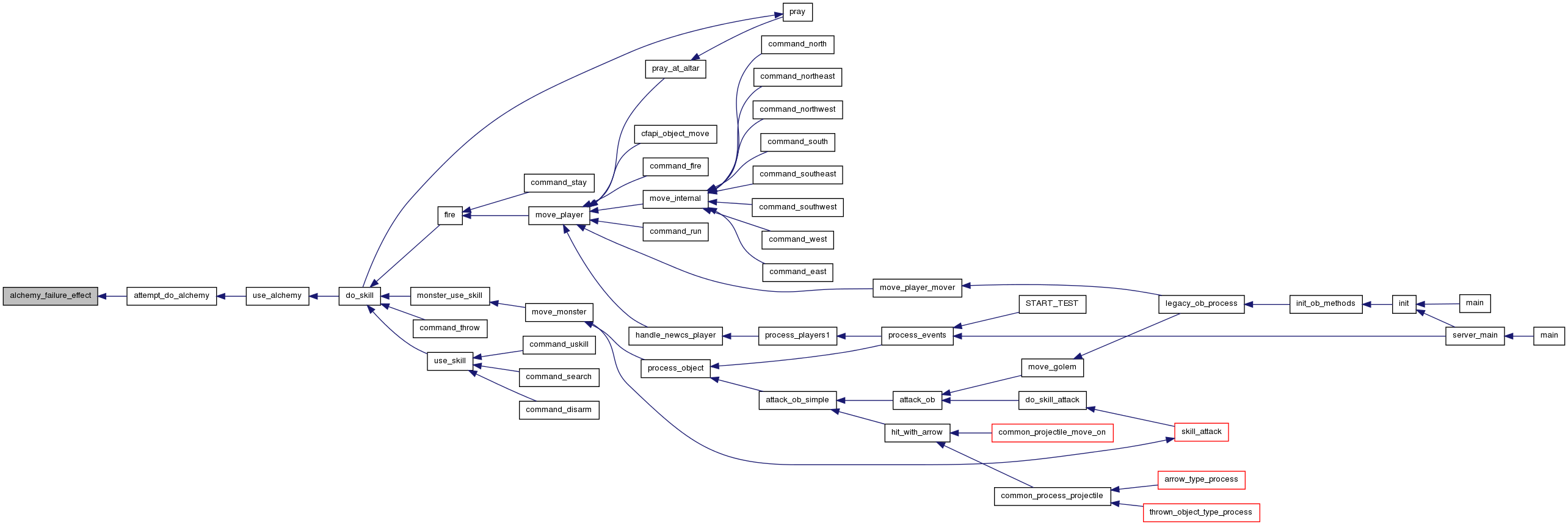
| static void attempt_do_alchemy | ( | object * | caster, |
| object * | cauldron | ||
| ) | [static] |
Main part of the ALCHEMY code.
From this we call fctns that take a look at the contents of the 'cauldron' and, using these ingredients, we construct an integer formula value which is referenced (randomly) against a formula list (the formula list chosen is based on the # contents of the cauldron).
If we get a match between the recipe indicated in cauldron contents and a randomly chosen one, an item is created and experience awarded. Otherwise various failure effects are possible (getting worse and worse w/ # cauldron ingredients). Note that the 'item' to be made can be *anything *listed on the artifacts list in lib/artifacts which has a recipe listed in lib/formulae.
To those wondering why I am using the funky formula index method: 1) I want to match recipe to ingredients regardless of ordering. 2) I want a fast search for the 'right' recipe.
Note: it is just possible that a totally different combination of ingredients will result in a match with a given recipe. This is not a bug! There is no good reason (in my mind) why alchemical processes have to be unique -- such a 'feature' is one reason why players might want to experiment around. :) -b.t.
- Parameters:
-
caster who is doing alchemy. cauldron the cauldron in which alchemy should take place.
Definition at line 121 of file alchemy.c.
References alchemy_failure_effect(), recipestruct::arch_name, attempt_recipe(), calc_alch_danger(), recipestruct::cauldron, change_exp(), content_recipe_value(), recipestruct::diff, draw_ext_info(), draw_ext_info_format(), recipestruct::exp, F_IDENTIFIED, F_NOT_CURSED, F_TRUE, find_recipe(), find_skill_by_name(), FLAG_WIZ, get_formulalist(), recipestruct::index, is_defined_recipe(), llevDebug, LOG(), MSG_TYPE_SKILL, MSG_TYPE_SKILL_FAILURE, MSG_TYPE_SKILL_MISSING, NDI_UNIQUE, numb_ob_inside(), recipeliststruct::number, PLAYER, PREFER_LOW, query_cost(), QUERY_FLAG, random_roll(), SK_EXP_NONE, recipestruct::skill, recipestruct::title, and recipeliststruct::total_chance.
Referenced by use_alchemy().
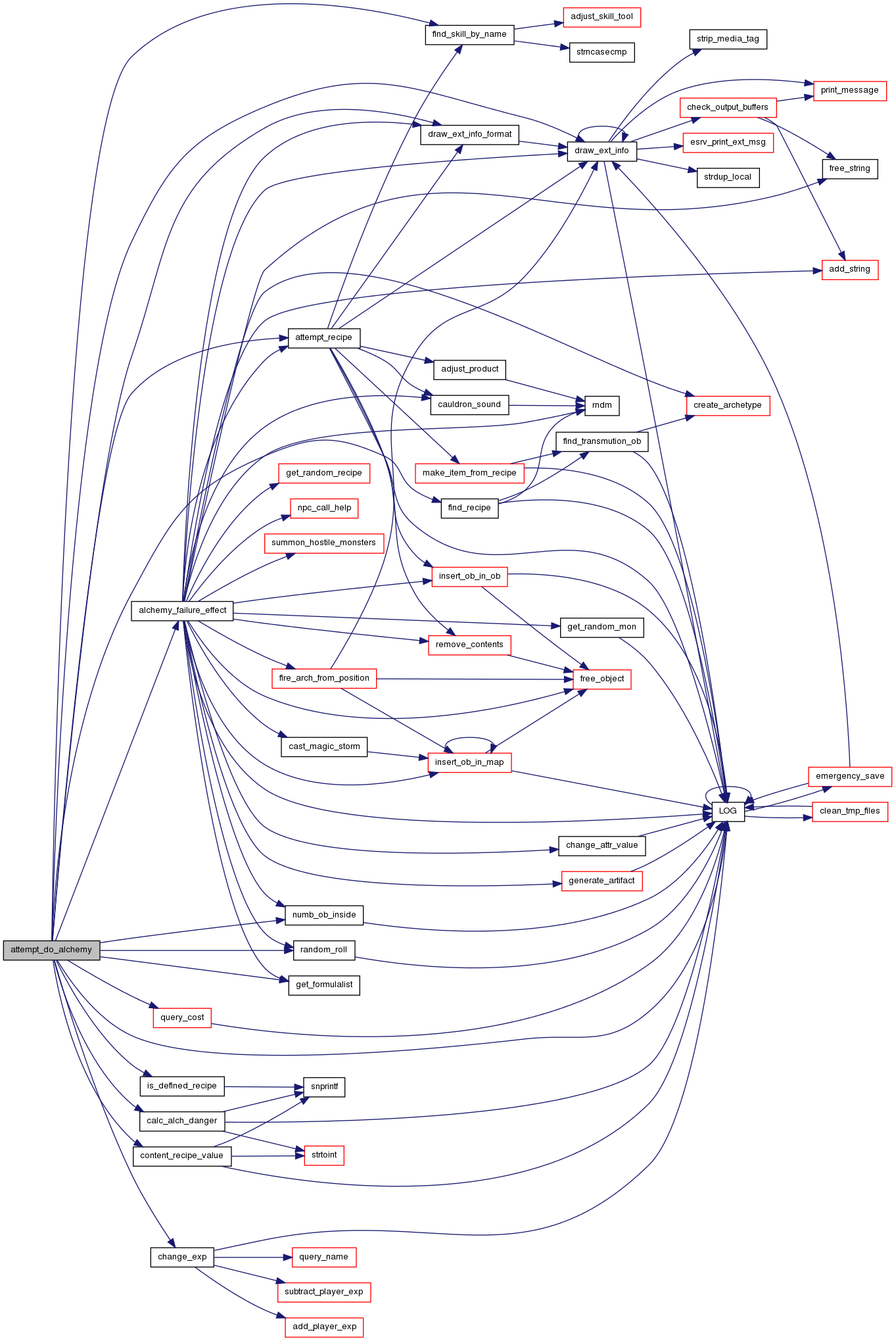
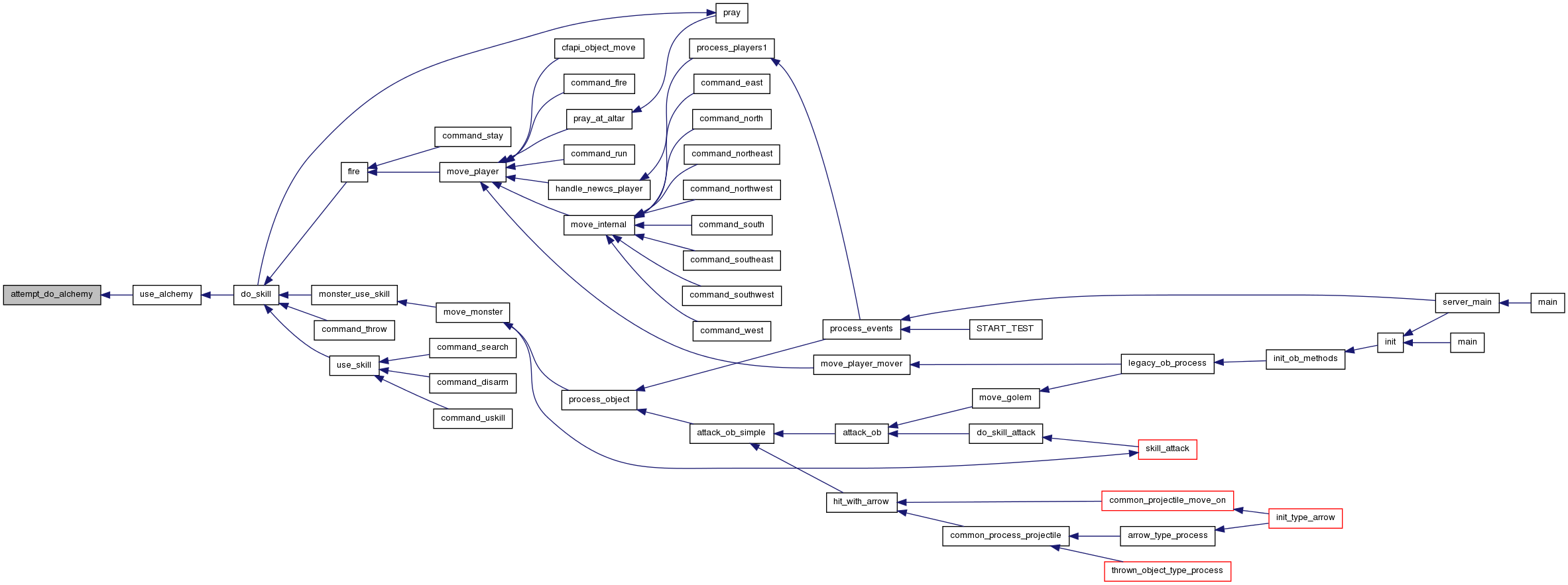
| static object * attempt_recipe | ( | object * | caster, |
| object * | cauldron, | ||
| int | ability, | ||
| recipe * | rp, | ||
| int | nbatches, | ||
| int | ignore_cauldron | ||
| ) | [static] |
Essentially a wrapper for make_item_from_recipe() and insert_ob_in_ob().
If the caster has some alchemy skill, then they might gain some exp from (successfull) fabrication of the product. If nbatches==-1, don't give exp for this creation (random generation/ failed recipe) If ignore_cauldron, don't check if we are using the matching cauldron type (shadow alchemy)
- Parameters:
-
caster who is trying to do alchemy. cauldron container used for alchemy. ability ? rp recipe attempted. nbatches ? ignore_cauldron if 0, checks the recipe uses the right cauldron type, else no check is done.
- Returns:
- generated item, can be NULL if contents were destroyed.
- Todo:
- check meaning of ability/nbatches.
Definition at line 305 of file alchemy.c.
References adjust_product(), recipestruct::cauldron, cauldron_sound(), draw_ext_info(), draw_ext_info_format(), find_skill_by_name(), FORCE, insert_ob_in_ob(), recipestruct::keycode, llevDebug, LOG(), make_item_from_recipe(), MSG_TYPE_SKILL, MSG_TYPE_SKILL_ERROR, MSG_TYPE_SKILL_FAILURE, MSG_TYPE_SKILL_SUCCESS, NDI_UNIQUE, remove_contents(), recipestruct::skill, recipestruct::title, and recipestruct::yield.
Referenced by alchemy_failure_effect(), and attempt_do_alchemy().
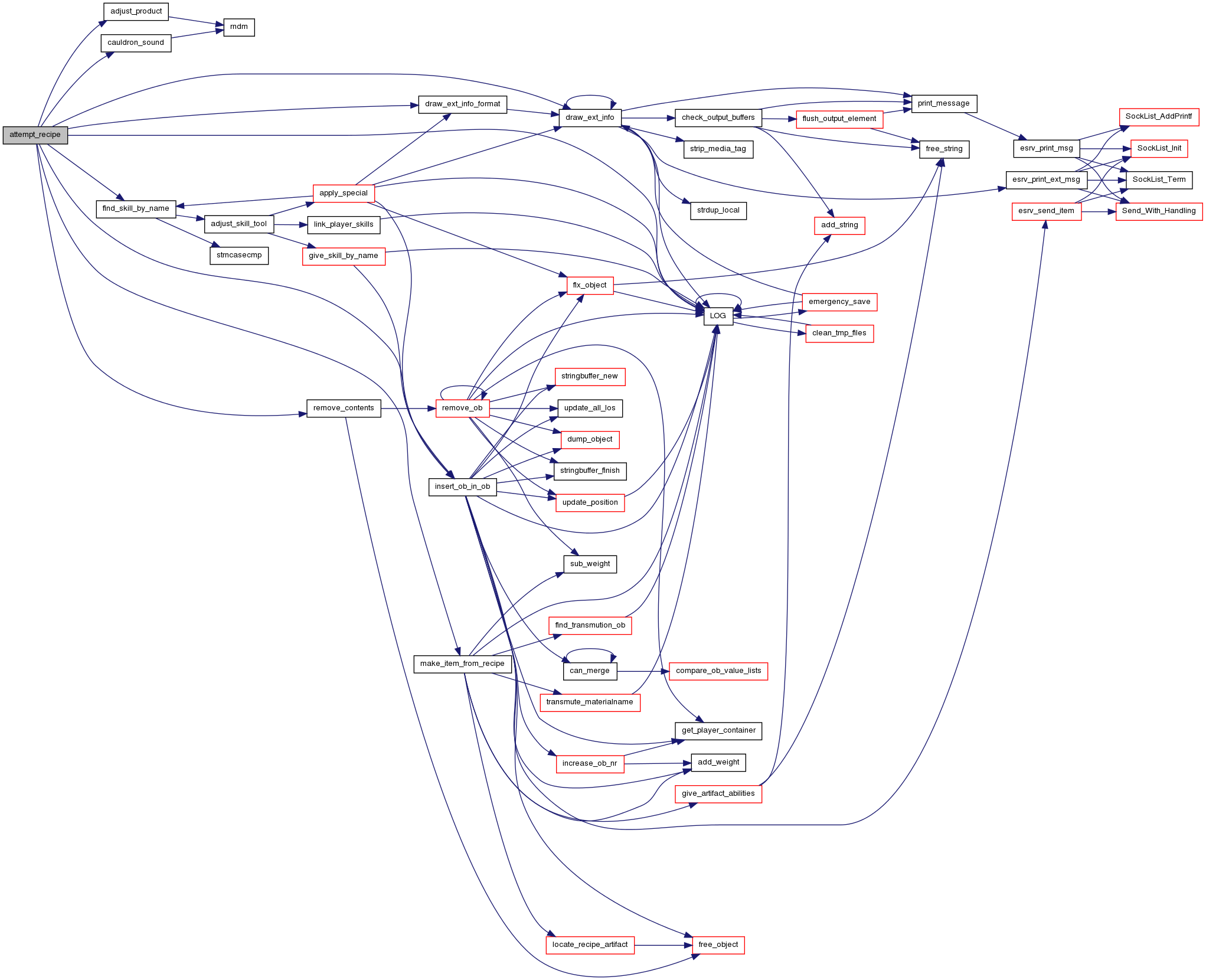

| static int calc_alch_danger | ( | object * | caster, |
| object * | cauldron, | ||
| recipe * | rp | ||
| ) | [static] |
"Danger" level, will determine how bad the backfire could be if the user fails to concoct a recipe properly.
Factors include the number of ingredients, the length of the name of each ingredient, the user's effective level, the user's Int and the enchantment on the mixing device (aka "cauldron"). Higher values of 'danger' indicate more danger. Note that we assume that we have had the caster ready the alchemy skill *before *this routine is called. (no longer auto-readies that skill) -b.t.
- Parameters:
-
caster who is trying alchemy. cauldron container used. rp recipe attempted.
- Returns:
- danger value.
Definition at line 783 of file alchemy.c.
References recipestruct::diff, FLAG_CURSED, FLAG_DAMNED, llevDebug, LOG(), MAX_BUF, QUERY_FLAG, snprintf(), and strtoint().
Referenced by attempt_do_alchemy().
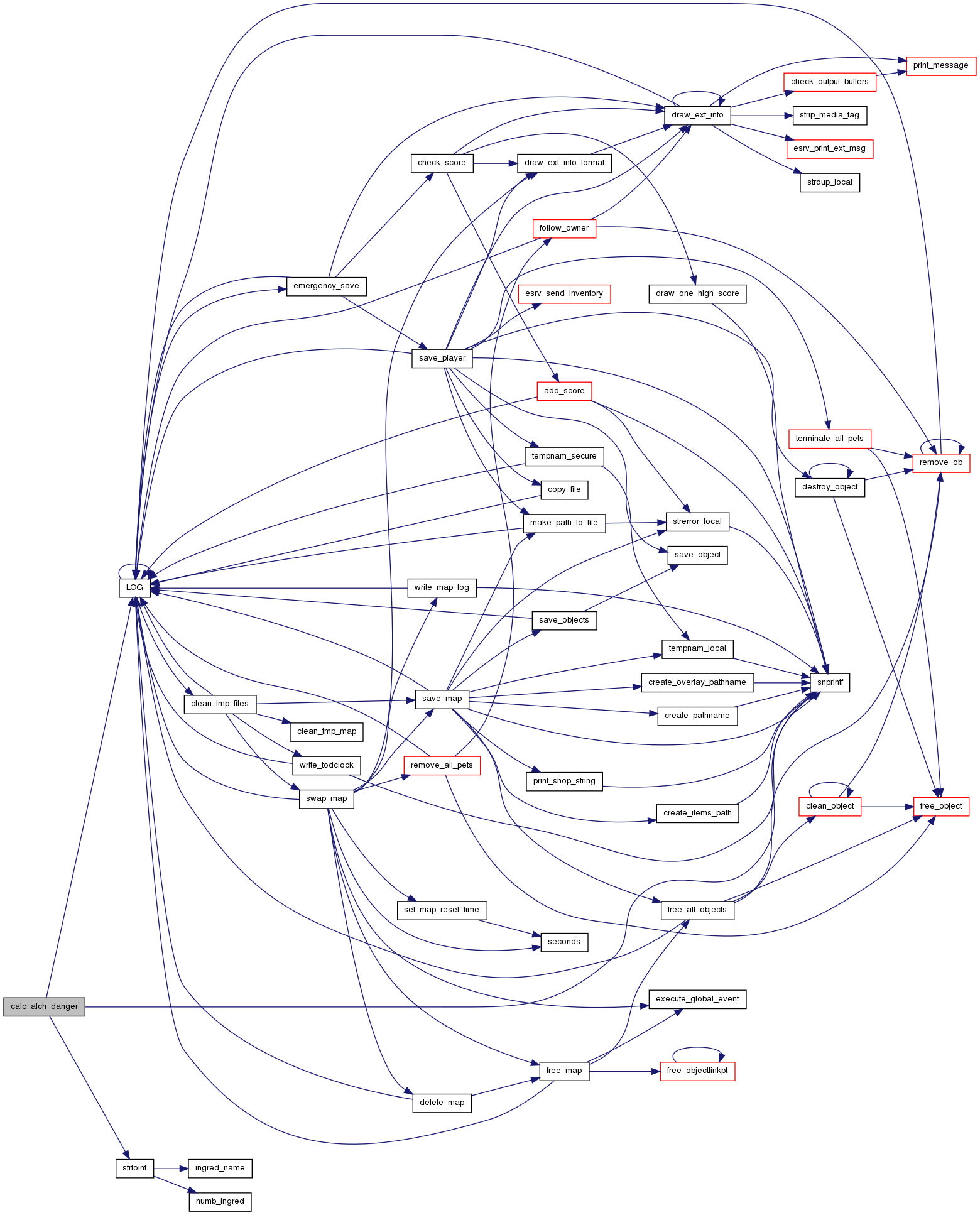
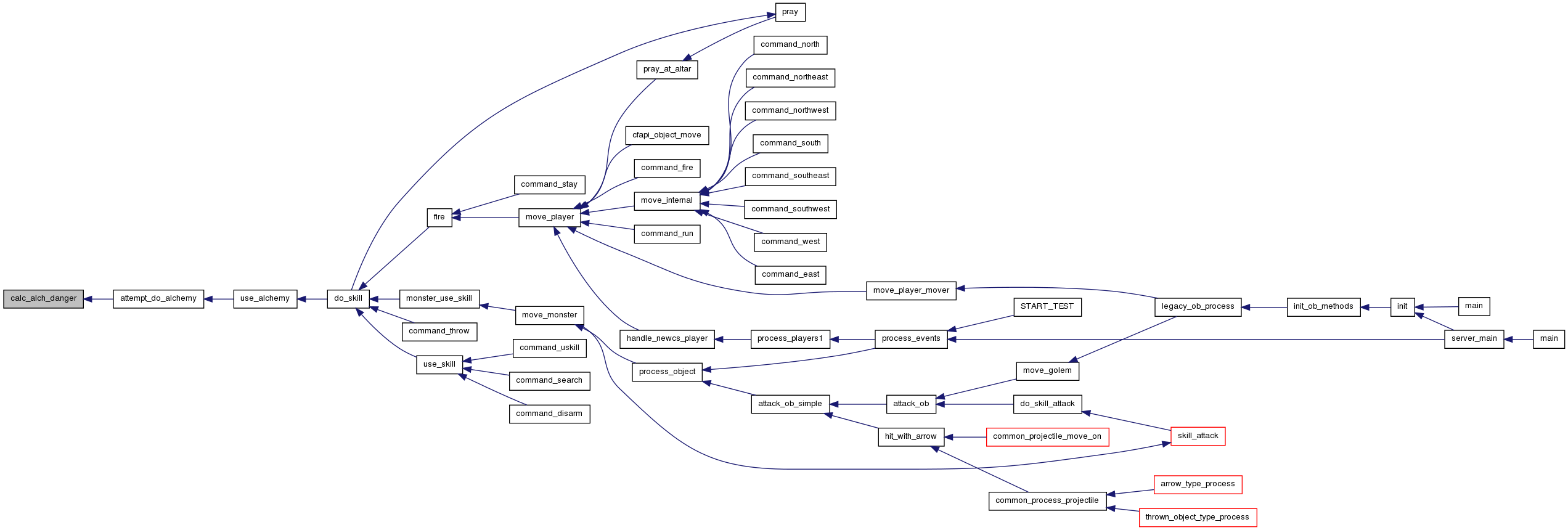
| static const char* cauldron_sound | ( | void | ) | [static] |
Returns a random selection from cauldron_effect[].
Definition at line 87 of file alchemy.c.
References cauldron_effect, and rndm().
Referenced by alchemy_failure_effect(), and attempt_recipe().


| static int content_recipe_value | ( | object * | op | ) | [static] |
Recipe value of the entire contents of a container.
This appears to just generate a hash value, which I guess for now works ok, but the possibility of duplicate hashes is certainly possible - msw
- Parameters:
-
op contained for which to generate a hash.
- Returns:
- hash value.
Definition at line 236 of file alchemy.c.
References llevDebug, LOG(), MAX_BUF, snprintf(), and strtoint().
Referenced by attempt_do_alchemy().
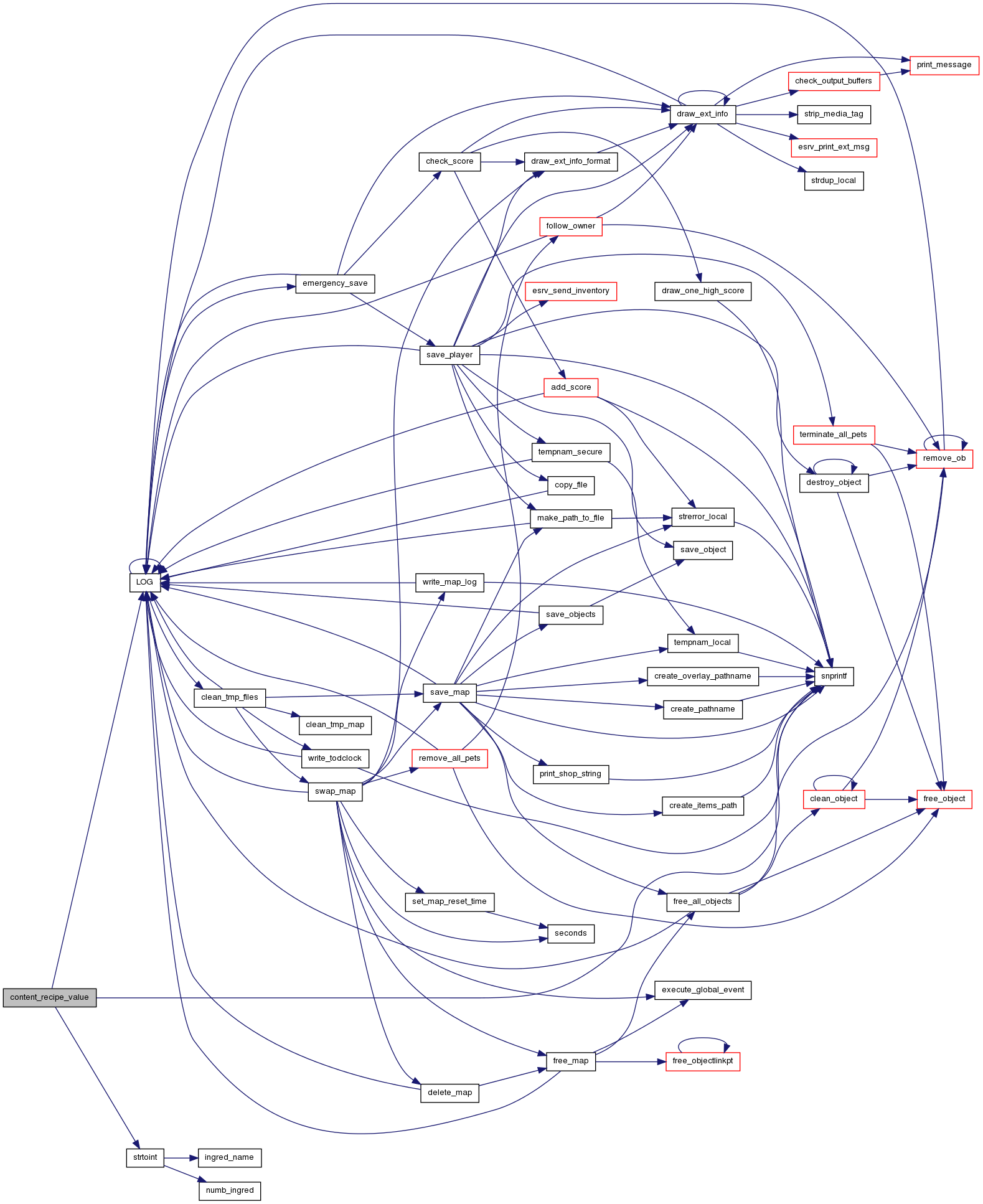
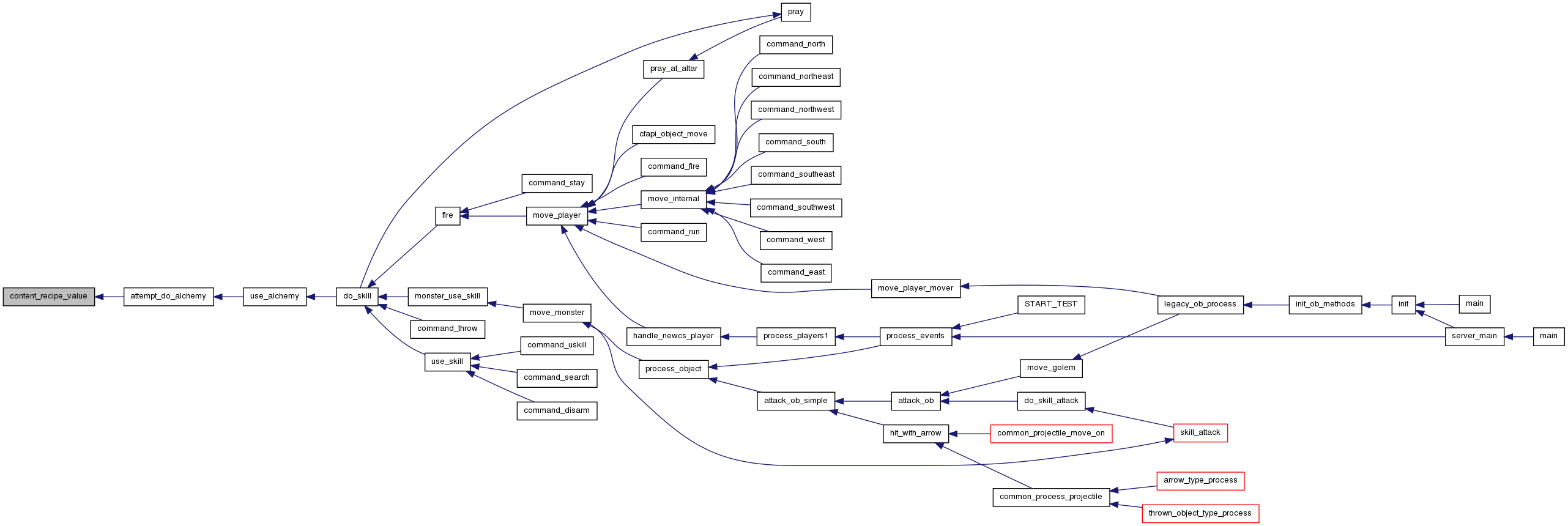
| static recipe * find_recipe | ( | recipelist * | fl, |
| int | formula, | ||
| object * | ingredients | ||
| ) | [static] |
Find a recipe from a recipe list that matches the given formula.
If there is more than one matching recipe, it selects a random one. If at least one transmuting recipe matches, it only considers matching transmuting recipes.
- Parameters:
-
fl ? formula ? ingredients ?
- Returns:
- one matching recipe, or NULL if no recipe matches
- Todo:
- document parameters.
Definition at line 929 of file alchemy.c.
References recipestruct::arch_name, find_transmution_ob(), recipestruct::index, recipeliststruct::items, llevDebug, LOG(), recipestruct::next, rndm(), recipestruct::title, and recipestruct::transmute.
Referenced by attempt_do_alchemy().
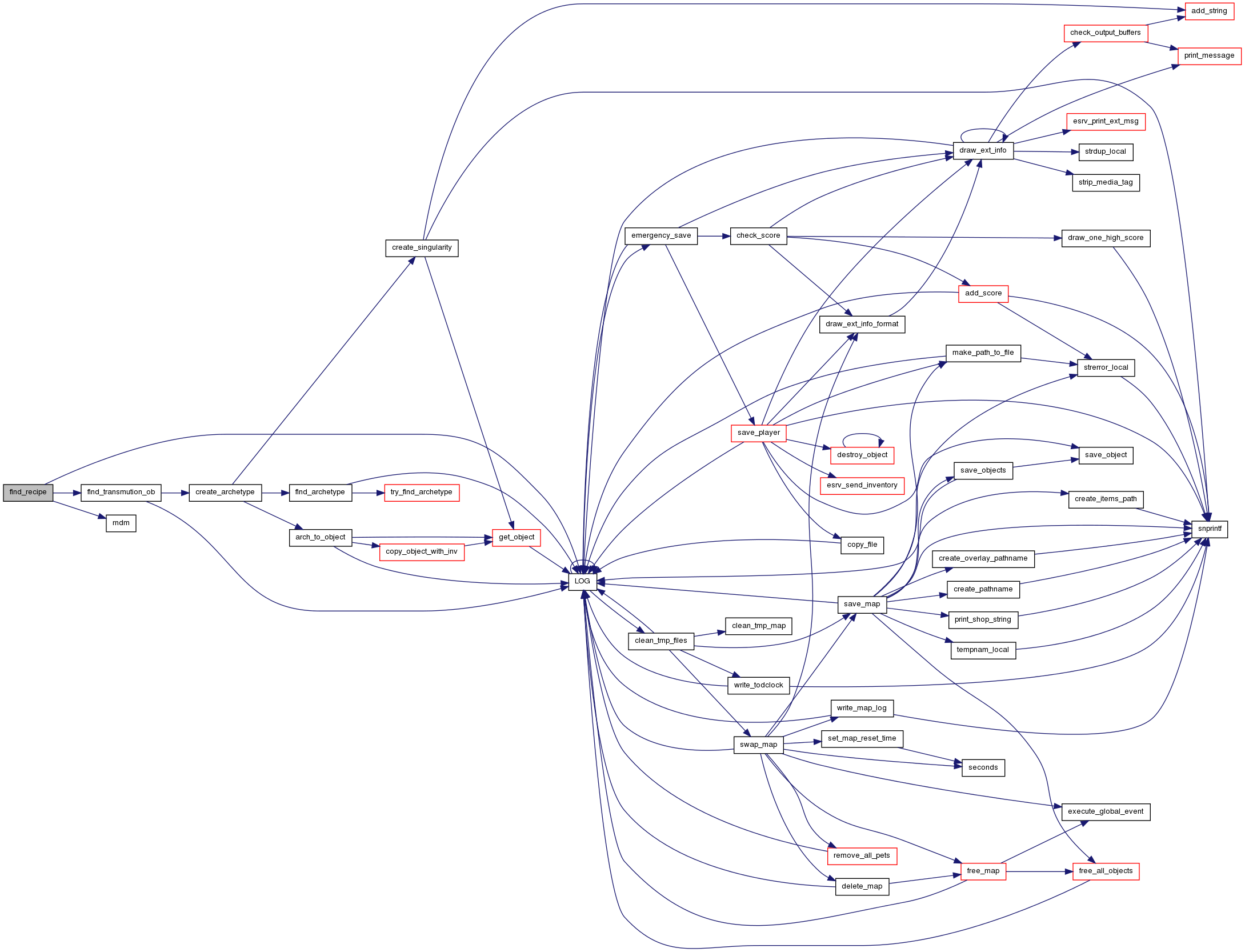
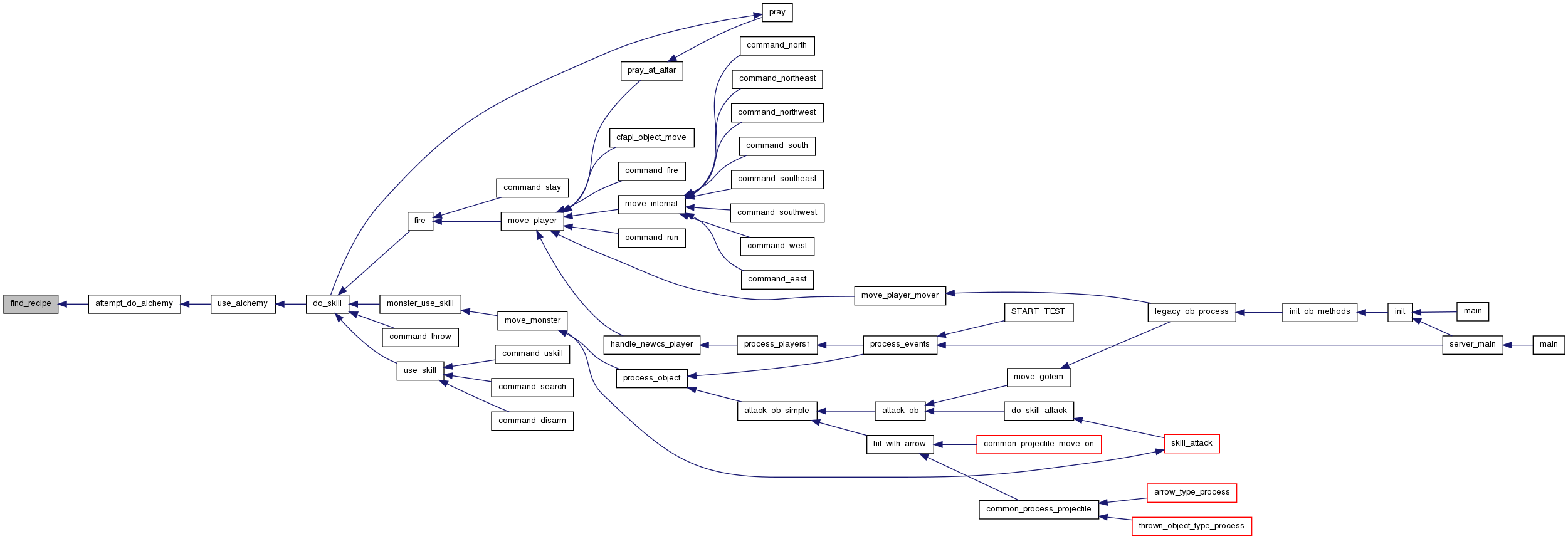
| static object * find_transmution_ob | ( | object * | first_ingred, |
| recipe * | rp, | ||
| size_t * | rp_arch_index, | ||
| int | create_item | ||
| ) | [static] |
Looks through the ingredient list.
If we find a suitable object in it - we will use that to make the requested artifact. Otherwise the code returns a 'generic' item if create_item is set. -b.t.
- Parameters:
-
first_ingred pointer to first item to check rp recipe the player is trying rp_arch_index pointer to return value; set to arch index for recipe; set to zero if not using a transmution formula create_item if set, will create a generic item if no suitable item is found.
- Returns:
- NULL if no suitable item was found and create_item is 0, existing or new item else.
Definition at line 450 of file alchemy.c.
References recipestruct::arch_name, recipestruct::arch_names, create_archetype(), llevDebug, LOG(), and recipestruct::transmute.
Referenced by find_recipe(), and make_item_from_recipe().
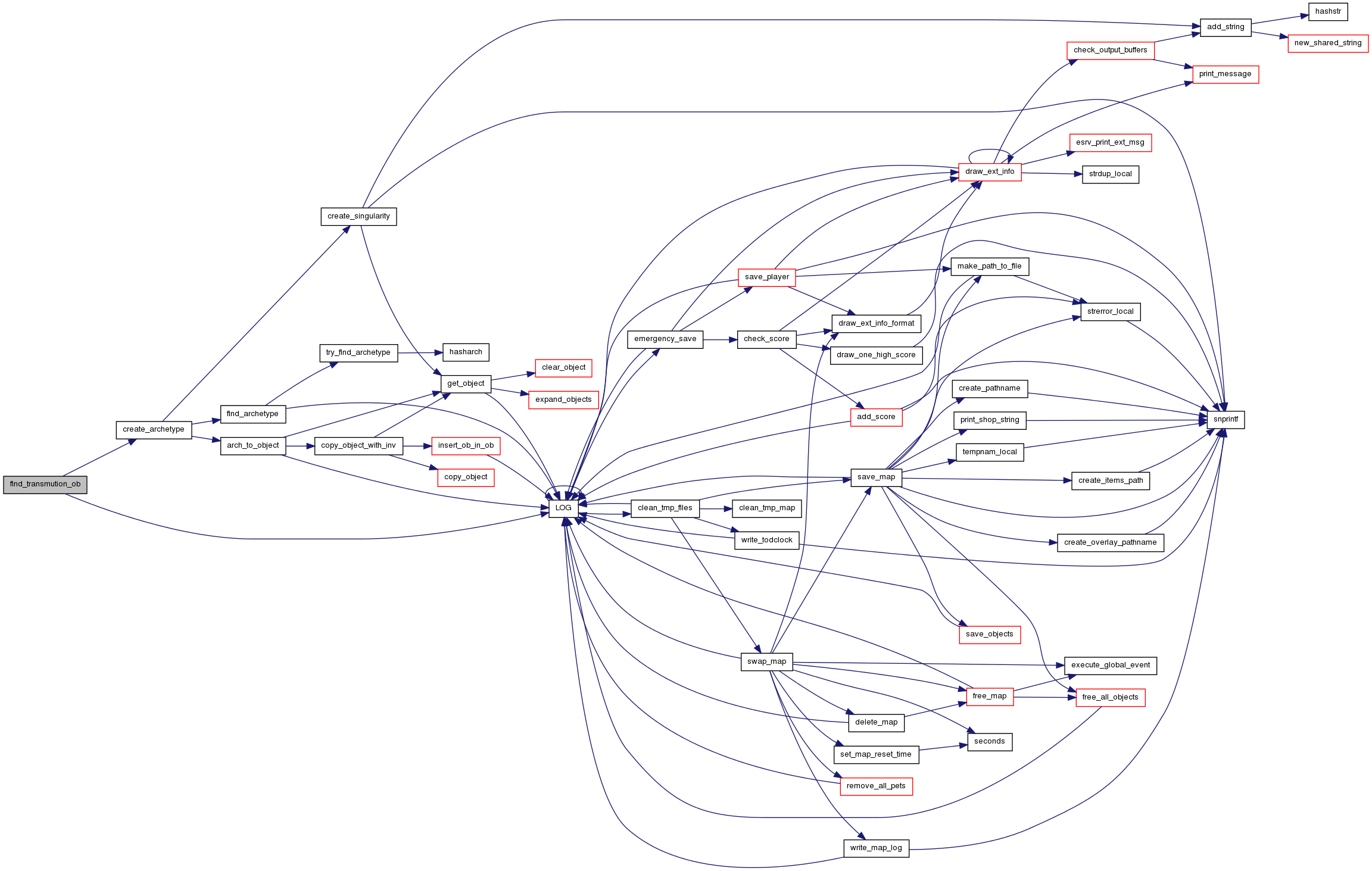

| static int is_defined_recipe | ( | const recipe * | rp, |
| const object * | cauldron, | ||
| object * | caster | ||
| ) | [static] |
Determines if ingredients in a container match the proper ingredients for a recipe.
This functions tries to find each defined ingredient in the container. It is the defined recipe iff
- the number of ingredients of the recipe and in the container is equal
- all ingredients of the recipe are found in the container
- the number of batches is the same for all ingredients
- Parameters:
-
rp recipe to check. cauldron container that holds the ingredients. caster who is trying to cast.
- Returns:
- 1 if the ingredients match the recipe, 0 if not.
Definition at line 845 of file alchemy.c.
References recipestruct::ingred, MAX_BUF, linked_char::name, linked_char::next, and snprintf().
Referenced by attempt_do_alchemy().

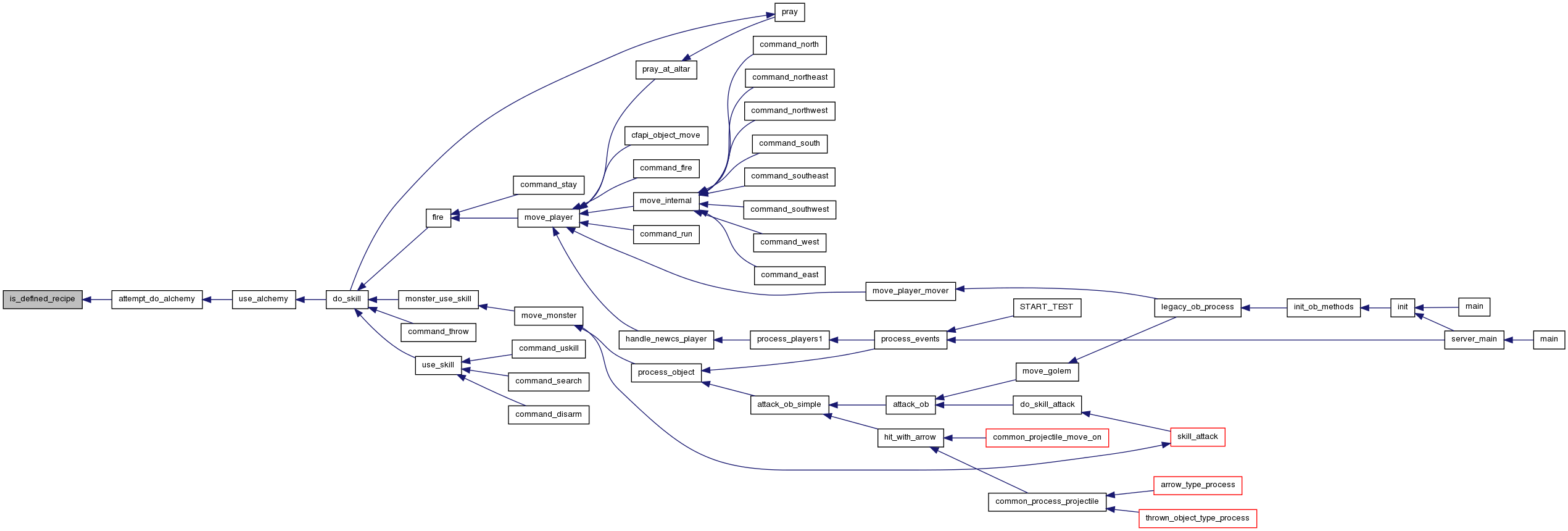
| static object * make_item_from_recipe | ( | object * | cauldron, |
| recipe * | rp | ||
| ) | [static] |
Using a list of items and a recipe to make an artifact.
- Parameters:
-
cauldron the cauldron (including the ingredients) used to make the item rp the recipe to make the artifact from
- Returns:
- the newly created object, NULL if something failed
Definition at line 398 of file alchemy.c.
References add_weight(), recipestruct::arch_name, find_transmution_ob(), FLAG_CURSED, FLAG_DAMNED, give_artifact_abilities(), artifactstruct::item, llevDebug, llevError, locate_recipe_artifact(), LOG(), QUERY_FLAG, SET_FLAG, sub_weight(), recipestruct::title, and transmute_materialname().
Referenced by attempt_recipe().
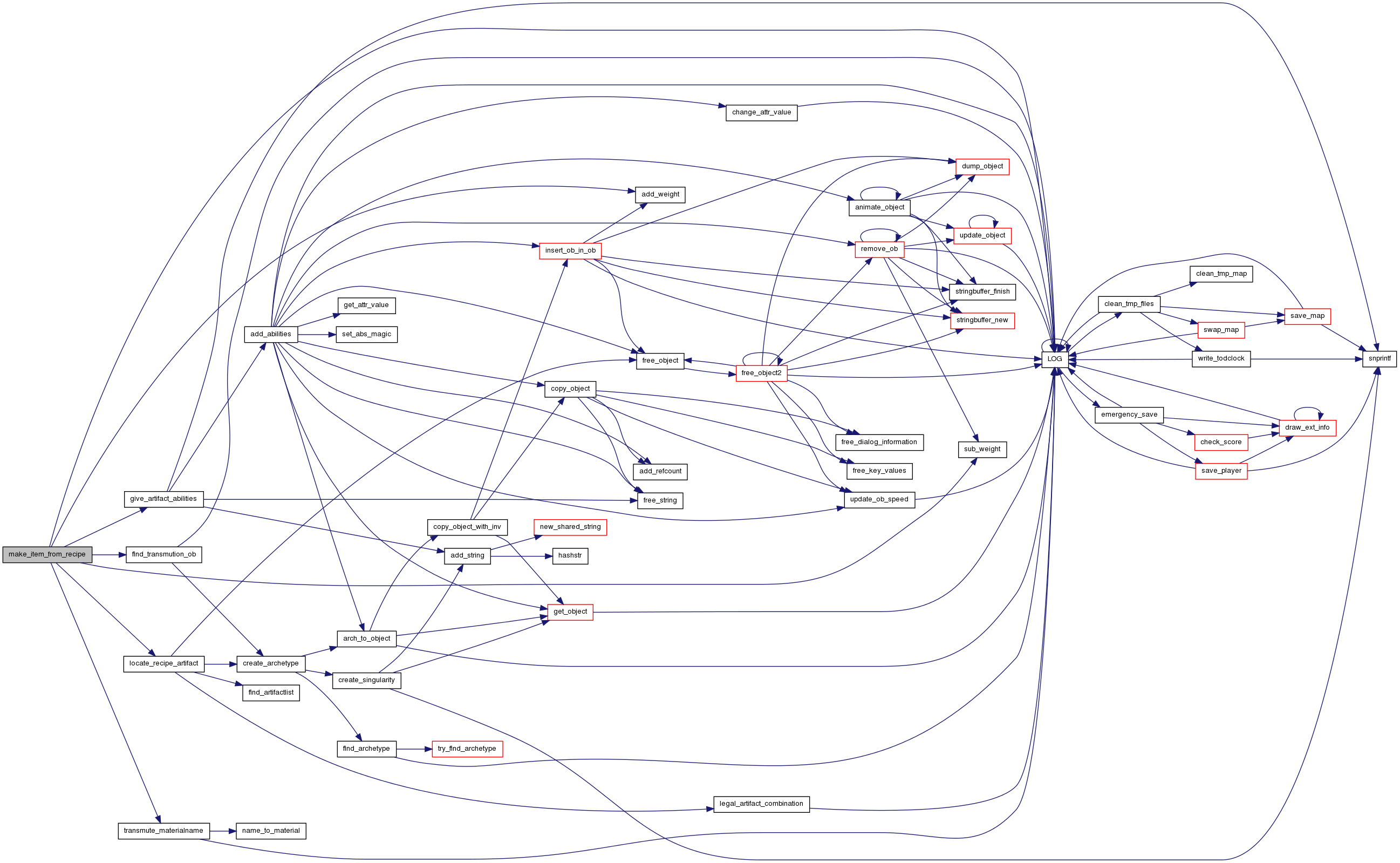

| static int numb_ob_inside | ( | object * | op | ) | [static] |
Returns the total number of items in op, excluding ones in item's items.
- Parameters:
-
op container.
- Returns:
- total item count.
Definition at line 266 of file alchemy.c.
References llevDebug, and LOG().
Referenced by alchemy_failure_effect(), and attempt_do_alchemy().
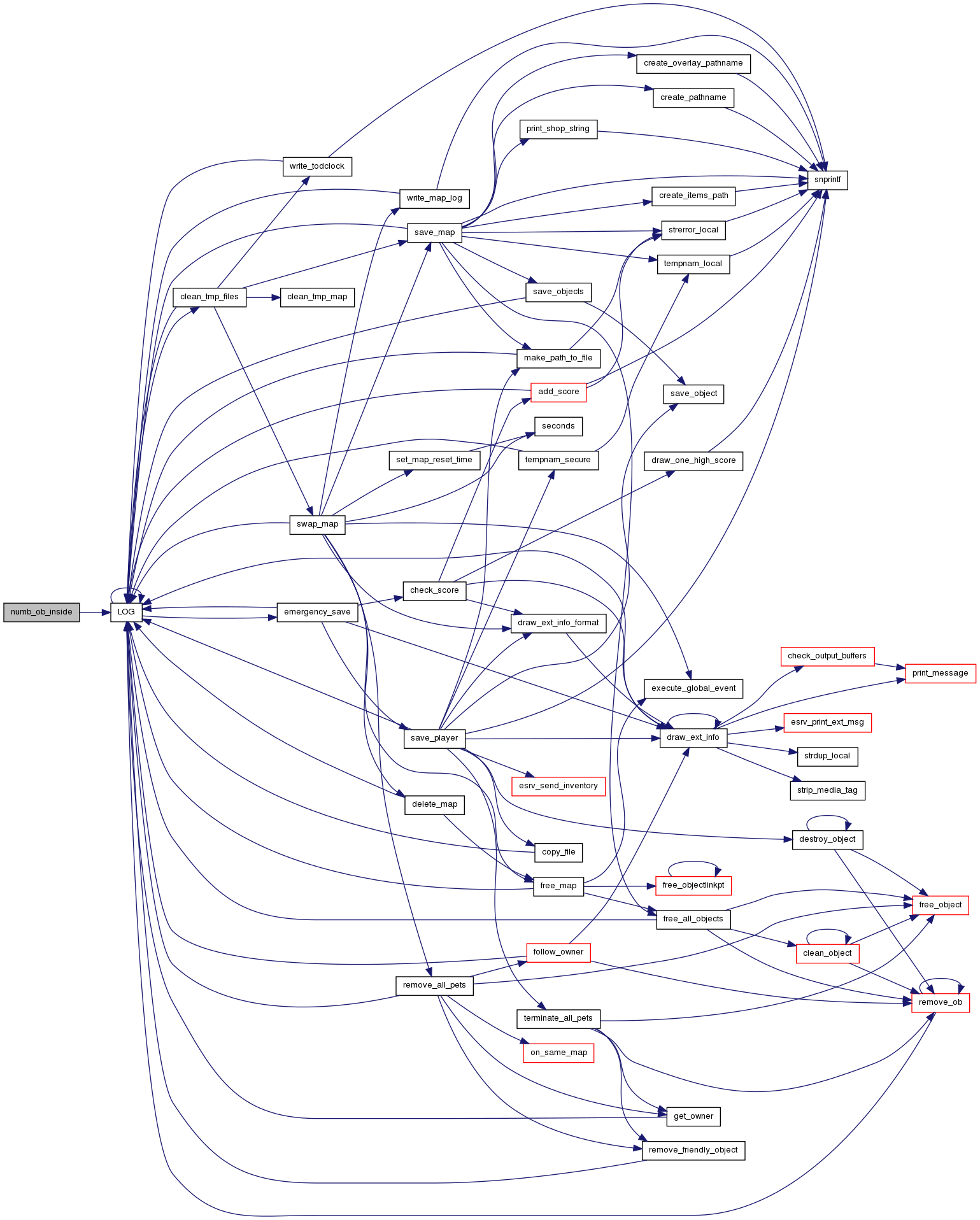

| static void remove_contents | ( | object * | first_ob, |
| object * | save_item | ||
| ) | [static] |
All but object "save_item" are elimentated from the container list.
Note we have to becareful to remove the inventories of objects in the cauldron inventory (ex icecube has stuff in it).
- Parameters:
-
first_ob container from which to remove. save_item what item to not remove. Can be NULL.
Definition at line 745 of file alchemy.c.
References free_object(), and remove_ob().
Referenced by alchemy_failure_effect(), and attempt_recipe().
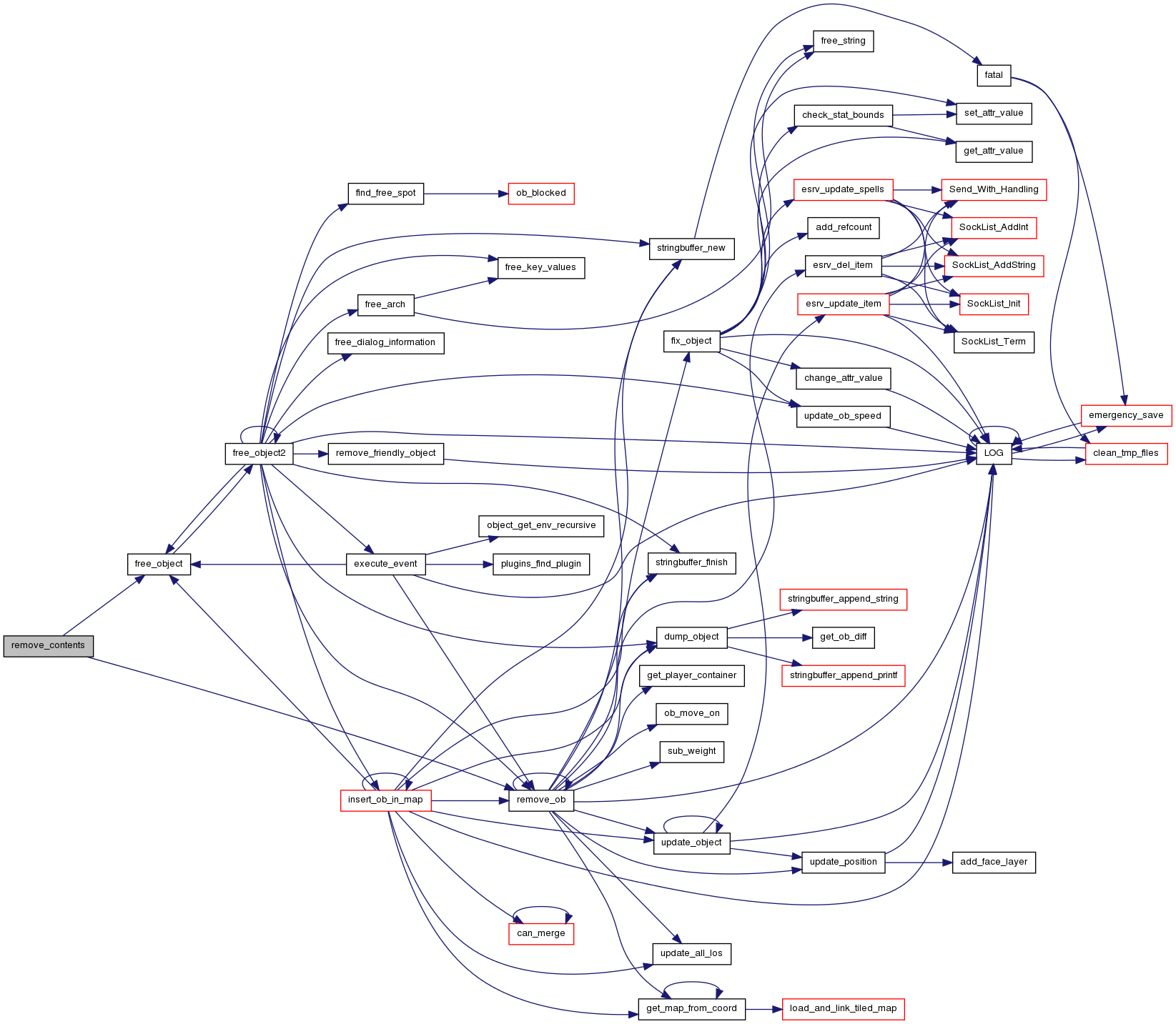

| int use_alchemy | ( | object * | op | ) |
Handle use_skill for alchemy-like items.
- Parameters:
-
op player trying to do alchemy.
- Returns:
- 1 if any recipe was attempted, 0 else.
- Note:
- Will inform player if attempting to use unpaid cauldron or ingredient.
- Todo:
- check if no superflous message when 2 cauldrons on same spot, one unpaid? (shouldn't happen, but well).
Definition at line 1006 of file alchemy.c.
References attempt_do_alchemy(), draw_ext_info_format(), esrv_send_inventory(), FLAG_APPLIED, FLAG_IS_CAULDRON, FLAG_UNPAID, GET_MAP_OB, MAX_BUF, MSG_TYPE_SKILL, MSG_TYPE_SKILL_ERROR, NDI_UNIQUE, query_base_name(), and QUERY_FLAG.
Referenced by do_skill().
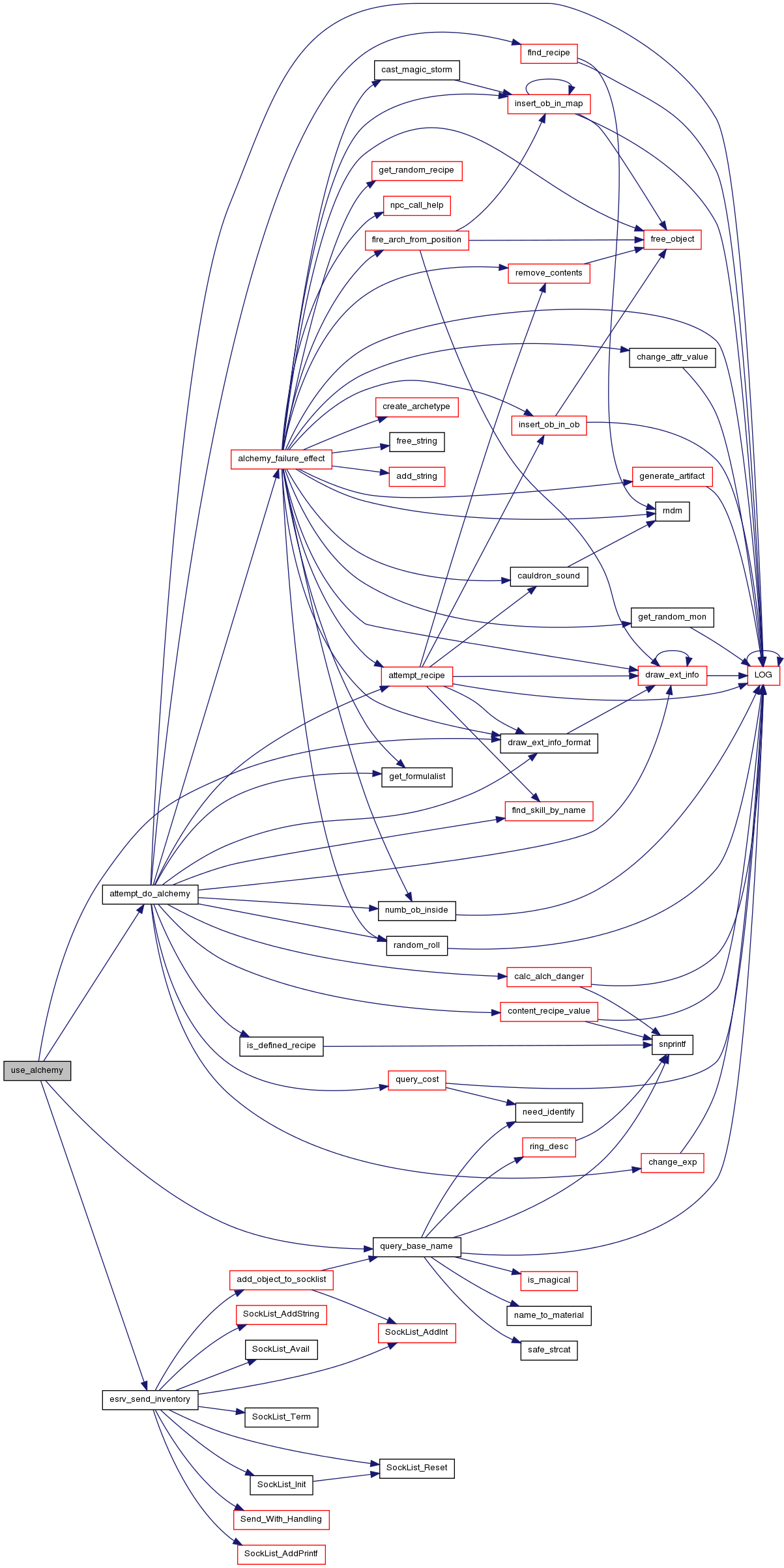
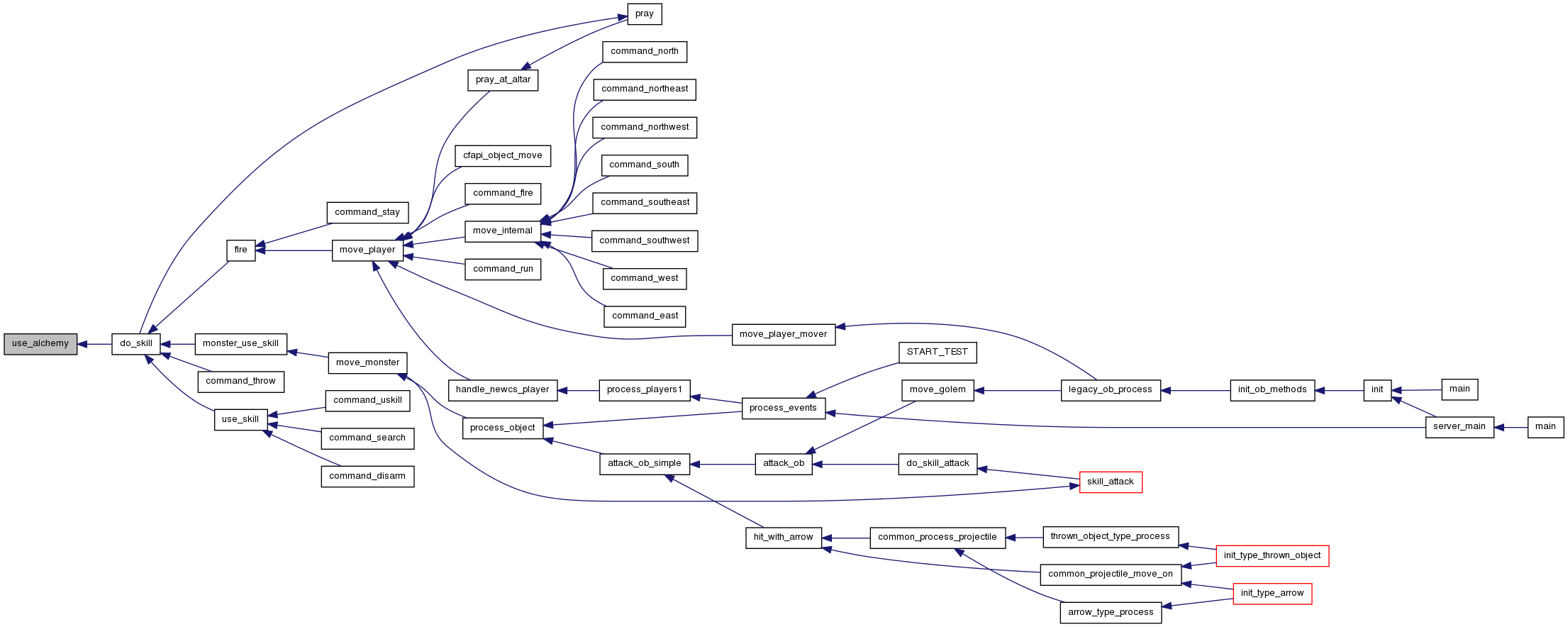
Variable Documentation
const char* const cauldron_effect[] [static] |
{
"vibrates briefly",
"produces a cloud of steam",
"emits bright flames",
"pours forth heavy black smoke",
"emits sparks",
"shoots out small flames",
"whines painfully",
"hiccups loudly",
"wheezes",
"burps",
"shakes",
"rattles",
"makes chugging sounds",
"smokes heavily for a while"
}
define this for some helpful debuging information
define this for loads of (marginal) debuging information Random cauldrons effects
Definition at line 55 of file alchemy.c.
Referenced by cauldron_sound().
 1.7.6.1
1.7.6.1